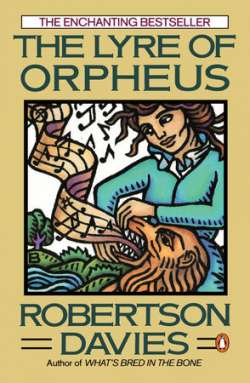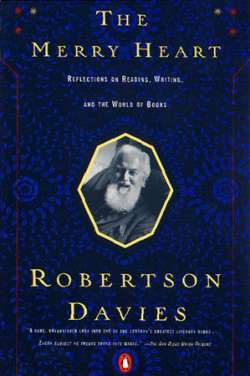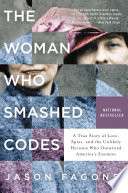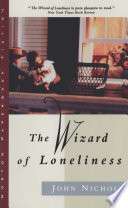« Return to all search results
Title Search Results

Hailed as a literary masterpiece, Robertson Davies' The Cornish Trilogy comes to a brilliant conclusion in the bestselling Lyre of Orpheus. There is an important decision to be made. The Cornish Foundation is thriving under the directorship of Arthur Cornish when Arthur and his beguiling wife, Maria Theotoky, decide to undertake a project worthy of Francis Cornish -- connoisseur, collector, and notable eccentric -- whose vast fortune endows the Foundation. The grumpy, grimy, extraordinarily talented music student Hulda Schnakenburg is commissioned to complete E. T .A. Hoffmann’s unfinished opera Arthur of Britain, or The Magnanimous Cuckold; and the scholarly priest Simon Darcourt finds himself charged with writing the libretto. Complications both practical and emotional arise: the gypsy in Maria’s blood rises with a vengeance; Darcourt stoops to petty crime; and various others indulge in perjury, blackmail, and other unsavory pursuits. Hoffmann’s dictum, "the lyre of Orpheus opens the door of the underworld," seems to be all too true -- especially when the long-hidden secrets of Francis Cornish himself are finally revealed. Baroque and deliciously funny, this third book in The Cornish Trilogy shows Robertson Davies at his very considerable best."Robertson Davies is the sort of novelist readers can hardly wait to tell their friends about." -- The Washington Post Book World

Hailed by the Washington Post Book World as "a modern classic," Robertson Davies’s acclaimed Deptford Trilogy is a glittering, fantastical, cunningly contrived series of novels, around which a mysterious death is woven. The Manticore—the second book in the series after Fifth Business—follows David Staunton, a man pleased with his success but haunted by his relationship with his larger-than-life father. As he seeks help through therapy, he encounters a wonderful cast of characters who help connect him to his past and the death of his father.For more than seventy years, Penguin has been the leading publisher of classic literature in the English-speaking world. With more than 1,700 titles, Penguin Classics represents a global bookshelf of the best works throughout history and across genres and disciplines. Readers trust the series to provide authoritative texts enhanced by introductions and notes by distinguished scholars and contemporary authors, as well as up-to-date translations by award-winning translators.

Readers around the world continue to mourn the 1995 death of a beloved literary icon, but this rich and varied collection of Robertson Davies's writings on the world of books and the miracle of language captures his inimitable voice and sustains his presence among us. Coming almost entirely from Davies' own files of unpublished material, these twenty-four essays and lectures are published for the first time.

Francis Cornish was always good at keeping secrets. From the well-hidden family secret of his childhood to his mysterious encounters with a small-town embalmer, an expert art restorer, a Bavarian countess, and various masters of espionage, the events in Francis’s life were not always what they seemed. In this wonderfully ingenious portrait of an art expert and collector of international renown, Robertson Davies has created a spellbinding tale of artistic triumph and heroic deceit. In this second book of the Cornish Trilogy, Davies spins a tale told in stylish, elegant prose, endowed with lavish portions of his wit and wisdom. "A deliciously readable story...An altogether remarkable creation, his most accomplished novel to date." -- The New York Times

Around the time of their parents' divorce, sisters April, May, and June recover special powers from childhood. Powers that come in handy navigating the hell that is high school. Powers that help them cope with the hardest year of their lives. But could they have a greater purpose? April, the oldest and a bit of a worrier, can see the future. Middle-child May can literally disappear. And baby June reads minds?everyone's but her own. When April gets a vision of disaster, the girls come together to save the day and reconcile their strained family. They realize that no matter what happens, powers or no powers, they'll always have each other. Because there's one thing stronger than magic: sisterhood.

No One Lives Forever is to be a fast-paced, story-driven first-person shooter that delivers over-the-top action, outrageous villains, and wry humor in the tradition of the great 1960's Bond films. You play Cate Archer an undercover operative for MI-Zero. Your mission is to arrange for the defection of a prominent East German biophysicist that goes by the name of Otto Dentz. However things go wrong when a terrorist group known as the HARM abducts Dentz during a flight to England. Assume the role of Cate Archer, an operative working for UNITY, a secret organization fighting to free the world from the clutches of H.A.R.M.. From tense subterfuge to in-your-face combat, No One Lives Forever ups the ante with 1960's-influenced spy action, vivid international locates, and deadly arch villains.

NATIONAL BESTSELLER NPR Best Book of 2017 “Not all superheroes wear capes, and Elizebeth Smith Friedman should be the subject of a future Wonder Woman movie.” — The New York Times Joining the ranks of Hidden Figures and In the Garden of Beasts, the incredible true story of the greatest codebreaking duo that ever lived, an American woman and her husband who invented the modern science of cryptology together and used it to confront the evils of their time, solving puzzles that unmasked Nazi spies and helped win World War II. In 1916, at the height of World War I, brilliant Shakespeare expert Elizebeth Smith went to work for an eccentric tycoon on his estate outside Chicago. The tycoon had close ties to the U.S. government, and he soon asked Elizebeth to apply her language skills to an exciting new venture: code-breaking. There she met the man who would become her husband, groundbreaking cryptologist William Friedman. Though she and Friedman are in many ways the "Adam and Eve" of the NSA, Elizebeth’s story, incredibly, has never been told. In The Woman Who Smashed Codes, Jason Fagone chronicles the life of this extraordinary woman, who played an integral role in our nation’s history for forty years. After World War I, Smith used her talents to catch gangsters and smugglers during Prohibition, then accepted a covert mission to discover and expose Nazi spy rings that were spreading like wildfire across South America, advancing ever closer to the United States. As World War II raged, Elizebeth fought a highly classified battle of wits against Hitler’s Reich, cracking multiple versions of the Enigma machine used by German spies. Meanwhile, inside an Army vault in Washington, William worked furiously to break Purple, the Japanese version of Enigma—and eventually succeeded, at a terrible cost to his personal life. Fagone unveils America’s code-breaking history through the prism of Smith’s life, bringing into focus the unforgettable events and colorful personalities that would help shape modern intelligence. Blending the lively pace and compelling detail that are the hallmarks of Erik Larson’s bestsellers with the atmosphere and intensity of The Imitation Game, The Woman Who Smashed Codes is page-turning popular history at its finest.

"John Nichols has remarkable insight into life's crazy blend of comedy and tragedy. . . . Pure pleasure to read." —New York Times Book Review It's World War II, and young Wendall Oler has been sent to stay will his father's family in rural Stebbinsville, Vermont. Using this opportunity to act out his resentment for the death of his mother and his father's leaving to fight in the war he does all he can to tyrannize his new family. Yet, thrown into the warmth of this country family, Wendall finds his resolve softening.

The Unadulterated Cat is becoming an endangered species as more and more of us settle for those boring mass-produced cats the ad-men sell us - the pussies that purr into their gold-plated food bowls on the telly. But the Campaign for Real Cats sets out to change all that by helping us to recognise a true, unadulterated cat when we see one. For example: real cats have ears that look like they've been trimmed with pinking shears; real cats never wear flea collars . . . or appear on Christmas cards . . . or chase anything with a bell in it; real cats do eat quiche. And giblets. And butter. And anything else left on the table, if they think they can get away with it. Real cats can hear a fridge door opening two rooms away . . .

After years of underground atomic testing, one of the animals living within the Wisawa caves (a system that stretches from Phantom Lake to the Deadlands) has undergone a radical and unimaginably horrible transformation! While exploring the caves, Dr. Vincent Edwards and colleague Rosemary Bennett stumble across evidence in the disappearance of local children. After reporting the find to the local sheriff, Dr. Edwards and Rosemary are tapped to lead a rescue attempt. Along with the sheriff and small-town farmer Stan Johnson (the children's father), the rescue party quickly comes to the realization that if the caves don't get them, whatever unseen terror lurking in the shadows just might!
